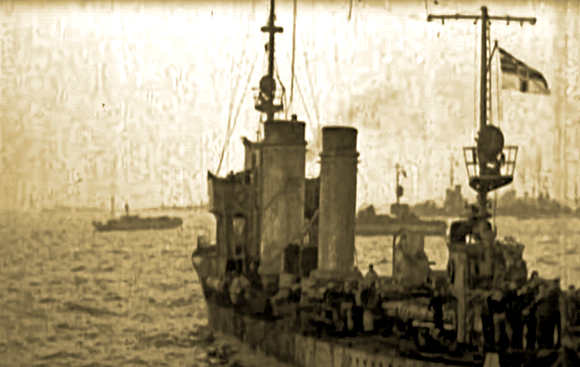 |
| British Blockade Ships on Station in the North Sea |
While their armies tried to break the stalemate in the trenches in France, the navies of Britain and Germany were locked in a struggle to win the war by destroying each other's commerce and starving their opponent into submission. Britain was quickly able to sweep Germany's cruisers from the world's oceans and thwart her plans to conduct a surface campaign against British shipping.
In turn, Britain clamped an ever-tightening blockade on Germany. Britain was able to effectively stop Germany's trade outside of Europe using the traditional methods of search and seizure. The British blockade slowly but surely took its toll on the German economy and war effort, inflicting privation on her people and severely affecting their health and morale.
The many elements covered in The Starvation Blockades include the torpedoing of the Lusitania, German plots detected by British intelligence, Q-ships, armed freighters, and air ships.
Germany turned to the new technology of the submarine to attempt a retaliatory blockade of Britain. Germany's final gamble on unrestricted submarine warfare in 1917 quickly took a desperate toll on British shipping and appeared capable of inflicting defeat on the Allies even after the U.S. entered the war. But the U.S. Navy quickly reinforced the British fleet, providing needed vessels for convoy escort and the strengthening of the blockade.
The convoy system defeated the U-boat and allowed the AEF to arrive in Europe. In The Starvation Blockades, Nigel Hawkins recounts the broad naval war, focusing on how the strategy of blockade was an overriding concern guiding the policies of both Britain and Germany. Mr. Hawkins presents a very clear and readable account of the bravery, cleverness, and sometimes foolishness of both sides in this struggle.
.
Source: Originally presented in the Winter 2009 issue of Relevance: Journal of the Great War Society
Clarke Shilling

Sounds good.
ReplyDeleteIt is fascinating to think of how Doyle predicted the submarine as unstoppable before the war.
It wasn't Britain who managed that blockade of Germany, but international jewry networks... as usual.
ReplyDeleteWe haven't had much antisemitic junk on this site yet, have we?
ReplyDelete